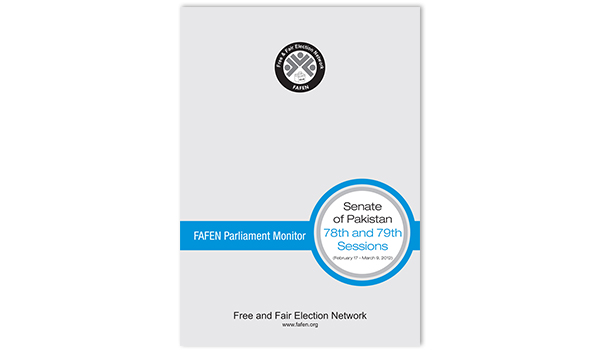During the 78th and 79th sessions of the Senate between February 17 and March 9, 2012, several Bills pertaining to transparency and democracy in electoral processes, economy, human rights, domestic violence and industrial relations, were passed. Two of these Bills were amendments to the existing constitution and laws.
A highlight of the 79th session was the approval of new rules for the Upper House. The Rules of Procedure and Conduct of Business, which replace the rules approved in 1988, have introduced significant changes like making ministers’ presence in the House mandatory during the Question Hour and abolishing discretionary powers of Chairman to appoint the Leader of Opposition. Similarly the new rules also introduce the Prime Minister’s Question Hour.
Questions asked from relevant ministries/ministers during Question Hour are an effective tool to evaluate the executive’s performance as well as to conduct its oversight. However, no Question Hour was held during the 78th session, whereas all Question Hours scheduled in the 79th session were either suspended or dispensed with.
The 78th session passed the 20th amendment to the constitution, providing legal cover to all by-elections conducted by the Election Commission during an interim period, as well as laying down procedures for filling relevant caretaker posts in the provincial and national assemblies when they are outgoing or stand dissolved. On the other hand, the 79th session saw an amendment being made to the Delimitation of Constituencies Bill, establishing geographical limits of constituencies for elections to the national and provincial assemblies after every census.
The Domestic Violence (Prevention and Protection) Bill for the safety of women and children in homes, and according protection to them from any physical, psychological and verbal abuse within homes as well as from extension of such abuse at workplaces etc. was passed during the 78th session. Also passed was the Industrial Relations Bill during the 79th session. It consolidates and rationalizes the formation of trade unions, improves and regulates relations between employers and workers in the Islamabad Capital Territory and in trans-provincial establishments and industry. Both these Bills were presented by Private Members (Members of Senate who do not hold any government or ministerial office).
Another Bill passed during the 79th session, was the Special Economic Zone Bill, to attract investment (especially foreign) by designating special zones where proactive and liberal economic policies would be implemented to meet the challenges of global competitiveness. The facilitation of increased foreign trade through this Bill has great potential for quality enhancement and creativity of domestic businesses.
Two days after the Upper House unanimously adopted a Resolution to condemn forced disappearances, during the 79th session it also passed a bill for setting up a commission on human rights. It empowers the proposed commission to “visit any jail or any other institution or place” under the government control “where convicts, under-trial prisoners or other persons are lodged or detained” for ascertaining “whether the provisions of the jail Manual and other applicable laws relating to the inmates are being compiled with.”
Also adopted were two other Resolutions in this session – one condemning the burning of the Quran by US troops at the Bagram Air Base in Afghanistan and the other relating to the suicide attacks on political meetings in Khyber Pakhtunkhwa. A third one – condolences at the death of a fellow senator – was adopted during the 78th session.
During the same session, there was a walkout led by an ANP Member, protesting false media reports pertaining to supposed arrest warrants issued by Interpol for an unnamed Senator from Khyber Pakhtunkhwa. All Members of the Opposition and some from the Coalition left the House for three minutes. Similarly, a 15-minute protest was staged by Senators belonging to the JUIF, PMLN and ANP as well as the Independent Members against US drone attacks.
There were 38 Points of Orders raised during both sessions which consumed 10% of the total time of 993- minutes. POs can be raised in case of a perceived breach in the proceedings of the House but are often misused to make speeches and rejoinders. Despite the erroneous use of POs, they still reflect the priorities of the Senators regarding the people they represent and issues of national importance. Among other subjects, the Parliamentarians spoke about agriculture, law and order, the National Reconciliation Ordinance, petroleum prices, rehabilitation and reconstruction etc.
All sittings of both sessions were delayed, on average, by 57 minutes. The average time of each sitting was 166 minutes. A maximum of 45 Members were present during each sitting, well above the 1/4th of the total Membership required to maintain Quorum. The Senators’ mandate of representing the people, discussing issues of national importance and passing necessary legislation can only be fulfilled if they are present in the House.
The Chairman, Deputy Chairman, Panel of Chairpersons, the Leader of the House and the Leader of the Opposition were present in all sittings. The Chairman presided over for 77% of the total duration of both sessions, and the Deputy Chairman for 23% of the time.
For complete report click here









